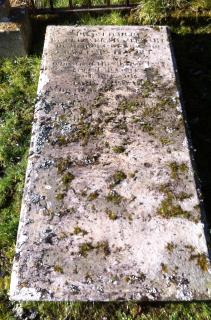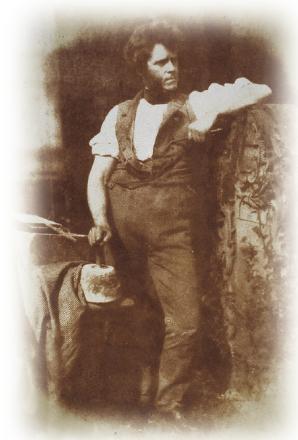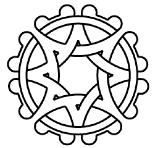
> Folk tale 1
Not long ago I wrought for about a week in the burying-ground of Kirk-Michael, a ruinous chapel in the eastern extremity of the parish of Resolis, distant about six miles from the town of Cromarty. It is a pleasant solitary spot, lying on the sweep of a gentle declivity. The sea flows to within a few yards of the lower wall; but the beach is so level, and so little exposed to the winds, that even in the time of tempest there is heard within its precincts only a faint rippling murmur, scarcely loud enough to awaken the echoes of the ruin. Ocean seems to muffle his waves in approaching this field of the dead. A row of elms springs out of the fence, and half encircles the building in the centre. Standing beside the mouldering walls, the foreground of the scene appears thickly sprinkled over with graves and tablets; and we see the green moss creeping round the rude sculptures of a primitive age, imparting lightness and beauty to that on which the chisel had bestowed a very opposite character. The flake-like leaves and gnarled trunks of the elms fill up what a painter would term the midground of the picture; and seen from between the boughs, the Bay of Cromarty, shut in by the Sutors so as to present the appearance of a huge lake, and the town beyond half enveloped in blue smoke - the windows sparkling through the cloud like spangles on a belt of azure - occupy the distance.
The western gable of the ruin is still entire, though the very foundations of part of the walls can no longer be traced on the sward, and it is topped by a belfry of hewn stone, in which the dead bell is still suspended. From the spires and balls with which the cornice is surmounted, the moss and lichens which bristle over the mouldings, and the stalks of ragweed which shoot out here and there from between the joints, the belfry, though designed in a barbarous style of architecture, is rich in the true picturesque. It furnished me, when the wind blew from the east, with an agreeable music, not, indeed, either gay or very varied, but of a character which suited well with that of the place. I wrought directly under it, and frequently paused in my labours to hearken the blast moaning amid its spires, and whistling through its apertures; and I have occasionally been startled by the mingling deathlike tones produced by the hammer, when forced by the wind against the sides of the bell. I was one day listening to this music, when, by one of those freaks which fling the light of recollection upon the dark recesses of the past, much in the manner that I have seen a child throwing the gleam of a mirror from the sunshine into the shade, there were brought before me the circumstances of a dream, deemed prophetic of the death of him whose epitaph I was then inscribing. It was one of those auguries of contingency which, according to Bacon, men mark when they hit, and never mark when they miss.
In the latter part of 1822 a young lad, a mason's apprentice, was employed with his master in working within the policies of Pointzfield - a gentleman's seat about a mile from the burying-ground. He wished much to visit the tombs and chapel, but could find no opportunity; for the day had so shortened that his employments engaged him from the first peep of light in the morning until half an hour after sunset. And perhaps the wish was the occasion of the dream. He had no sooner fallen asleep, after the fatigues of the day, than he found himself approaching the chapel in one of the finest of midsummer evenings. The whole western heavens were suffused with the blush of sunset - the hills, the woods, the fields, the sea, all the limbs and members of the great frame of nature, seemed enveloped in a mantle of beauty. He reached the burying-ground, and deemed it the loveliest spot he had ever seen. The tombs were finished after the most exquisite designs, chastely Grecian, or ornately Gothic; and myriads of flowering shrubs winded around the urns, and shaded the tablets in every disposition of beauty. The building seemed entire, but it was so encrusted with moss and lichens as to present an appearance of extreme antiquity; and on the western gable there was fixed a huge gnomon of bronze, fantastically carved like that of an antique dial, and green with the rust of ages. Suddenly a low breeze began to moan through the shrubs and bushes, the heavens became overcast, and the dreamer, turning towards the building, beheld with a sensation of fear the gnomon revolving slowly as on an axis, until the point rested significantly on the sward. He fled the place in deep horror, the night suddenly fell, and when floundering on in darkness and terror, through a morass that stretches beyond the southern wall of the chapel, he awoke, and lo! it was a dream. Only five weeks elapsed from this evening, until he followed to the burying-ground the corpse of a relative, and saw that the open grave occupied the identical spot on which the point of the gnomon had rested.
> Folk tale 2
There lived, about a century ago, in the upper part of the parish of Cromarty, an elderly female of that disposition of mind which Bacon describes as one of the very errors of human nature. Her faculties of enjoyment and suffering seemed connected by some invisible tie to the fortunes of her neighbours; but the tie, unlike that of sympathy, which binds pleasure to pleasure, and sorrow to sorrow, united by a strange perversity to the opposite feelings; for she was happy when the people around her were unfortunate, and miserable when they prospered. So decided a misanthropy was met by a kindred feeling in those acquainted with her; nor was she regarded with only that abhorrence which attaches to the evil wish, and the malignant intention, but also with the contempt due to that impotency of malice which can only wish and intend.
Her sphere of mischief, however, though limited by her circumstances, was occupied to its utmost boundary; and she frequently made up for her want of power by an ingenuity, derived from what seemed an almost instinctive knowledge of the weaknesses of human nature. It was difficult to tell how she effected her schemes, but certain it was that in her neighbourhood lovers became estranged, and families divided. Late in the autumn of her last year, she formed one of a band of reapers employed in cutting down the crops of a Cromarty farmer. Her partner on the ridge was a poor widow, who had recently lost her husband, and who, though wasted by grief and sickness, was now toiling for her three fatherless children. Every person on the field pitied her but one; and the malice of even that one, perverted as her dispositions were, would probably have been disarmed by the helplessness of its object, had it not chanced, that about five years before, when the poor woman and her deceased husband were on the eve of their marriage, she had attempted to break off the match, by casting some foul aspersions on her character. Those whom the wicked injure, says the adage, they never forgive; and with a demoniac abuse of her knowledge of the dispositions of the people with whom she wrought, she strained beyond her strength to get ahead of them, knowing that a competition would necessarily take place, in which, she trusted, the widow would have either to relinquish her employment as above her strength, or so exhaust herself in the contest as to relapse into sickness. The expected struggle ensued, but, to the surprise of every one, the widow kept up her place in the foremost rank until evening, when she appeared less fatigued than almost any individual of the party. The wretch who had occasioned the contest, and who had fallen behind all the others, seemed dreadfully agitated for the two last hours it continued; and she was heard by the persons who bound up the sheaves, muttering, during the whole time, words apparently of fearful meaning, which were, however, drowned amid the rustling of the corn, and the hurry and confusion of the competition. Next morning she alone of all the reapers was absent; and she was found by the widow, who seemed the only one solicitous to know what had become of her, and who first entered her hovel to inquire after her, tossing in the delirium of fever. The poor woman, though shocked and terrified by her ravings and her agony, tended her till within half an hour of midnight, when she expired.
At that late hour a solitary traveller was passing the road which winds along the southern shore of the bay. The moon, in her last quarter, had just risen over the hill on his right, and, half-veiled by three strips of cloud, rather resembled a heap of ignited charcoal seen through the bars of a grate, than the orb which only a few nights before had enabled the reaper to prosecute his employments until near morning. The blocks of granite scattered over the neighbouring beach, and bleached and polished by the waves, were relieved by the moonshine, and resembled flocks of sheep ruminating on a meadow; but not a single ray rested on the sea beyond, or the path or fields before; - the beam slided ineffectually along the level; - it was light looking at darkness. On a sudden, the traveller became conscious of that strange mysterious emotion, which, according to the creed of the demonologist, indicates the presence or near approach of an evil spirit. He felt his whole frame as if creeping together, and his hair bristling on his head; and, filled with a strange horror, he heard, through the dead stillness of the night, a faint uncertain noise, like that of a sudden breeze rustling through a wood at the close of autumn. He blessed himself, and stood still. A tall figure, indistinct in the darkness, came gliding along the road from the east, and inquired of him in a voice hollow and agitated, as it floated past, whether it could not reach Kirk-Michael before midnight? "No living person could," answered the traveller; and the appearance, groaning at the reply, was out of sight in a moment. The sounds still continued, as if a multitude of leaves were falling from the boughs of a forest, and striking with a pattering sound on the heaps congregated beneath, when another figure came up, taller, but even less distinct, than the former. It bore the appearance of a man on horseback. "Shall I reach Kirk-Michael before midnight?" was the query again put to the terrified traveller; but before he could reply, the appearance had vanished in the distance, and a shriek of torment and despair, which seemed re-echoed by the very firmanent, roused him into a more intense feeling of horror. The moon shone out with supernatural brightness; the noise, which had ceased for a moment, returned, but the sounds were different - for they now seemed to be those of faint laughter, and low indistinct murmurings in the tone of ridicule; and the gigantic rider of a pale horse, with what appeared to be a female shape bent double before him, and accompanied by two dogs, one of which tugged at the head and the other at the feet of the figure, was seen approaching from the west. As this terrible apparition passed the traveller, the moon shone full on the face of the woman bent across the horse, and he distinctly perceived, though the features seemed convulsed with agony, that they were those of the female who, unknown to him, had expired a few minutes before.
Kirkmichael is closely associated with Cromarty stonemason, geologist, editor and bestselling author, Hugh Miller.
He worked in the graveyard - we think on this stone (below & right) which by now is in poor condition - and on nearby Poyntzfield. Some of his spookiest folk-tales are based on Kirkmichael. Please take a look at the Hugh Miller website at "http://www.hughmiller.org" and visit his house in Cromarty to get a full appreciation of this complex man. The Kirkmichael Trust recently participated in the Hugh Miller "Window on the World" event, erecting a fallen finial, covered in ivy, in the window of Hugh Miller's cottage for one day during the Christmas period, and thereafter in the cottage itself, to raise awareness of the connections between the two heritage sites.


Placed here / by ELIZABETH STEWART / in memory of her son / WILLIAM STEWART / farmer Ardivall / who died the 31 Decr 1822 / aged 30 years / of her son / JOHN STEWART / who died the 8th Jany 1823 / aged 28 years / and of her daughter / JANNET STEWART / who died the 21 Nov 1823 / aged 33 years


